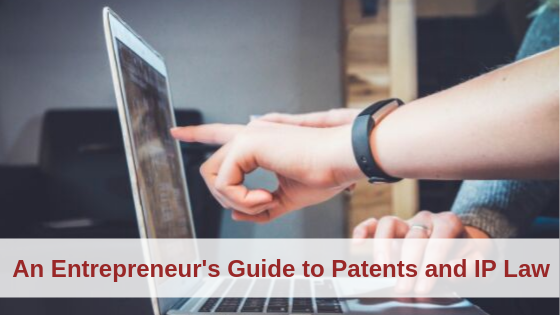
An Entrepreneur’s Guide to Patents and IP Law | By Tori Lutz
Today’s post is written by Tori Lutz, an author at Bold Patents, a patent law firm with the mission to enable innovators to improve our world through rock-solid patent protection! Bold Patents’ clients are investors, entrepreneurs, and scientists who are pushing the limits, doing what has never been done before, and taking risks in the spirit of progress and positive change.

Being an entrepreneur is exciting, especially when you get to watch your ideas form and evolve into your own startup. That said, it’s also pretty stressful. There’s a great deal of risk involved and a lot of different things to stay on top of if you actually want to develop your business and turn a profit.
That stress may make you a little hesitant to take on more concerns and responsibilities, but if anything should be added to that list, it should absolutely be a grasp of intellectual property (IP) law and how to protect your original ideas.
To help you get started and form a good understanding, here is an entrepreneur’s guide to patents and IP law!
What is Intellectual Property?
Intellectual property has an extremely vast domain since there are so many different ways that original ideas can be incorporated and brought to market. It can be anything from the lyrics to an original song to your company’s logo or even the unique invention that you have been developing to sell.
Since original ideas take a great deal of creativity, talent and work to develop, they are worth noting and protecting. Intellectual property isn’t a physical, tangible piece of property, either, since ideas are abstract and the work that goes into them is what should be valued. This is why an entire term was created for this type of property so that creative, entrepreneurial individuals can still have rights to something that is their own, even if it isn’t as solid as other types of property.
What is IP Law?

Since intellectual property is such a broad term, IP law is split into four main areas: copyrights to protect any form of art, trademarks to protect elements of branding (names, logos, slogans, etc.), patents to protect inventions and trade secrets to protect important, independently valuable knowledge (secret ingredients, vendor lists, etc.) that are critical to the success of your business.
Essentially, the importance of recognizing and protecting intellectual property is a core part of business and innovation. It’s hard to stay motivated as a fresh entrepreneur if you can’t even establish yourself and your invention before larger companies swoop in and produce it in higher quantities at a lower cost.
IP law helps to protect creative individuals and inspire them to keep working on executing their ideas without the fear that someone else will simply steal it in the blink of an eye. Plus, it promotes a level of fairness in the marketplace by giving due credit and making sure everyone has the right to their original ideas.
The best part is that common law exists for copyrights, trademarks and trade secrets. This basically means that even without formal, official registration, you still have rights to your work as soon as you introduce it on a public platform (posting it online, recording it, etc.). Of course, official registration definitely has its benefits when it comes to actually taking action against infringement, so depending solely on common law isn’t the best idea!
That said, patents do not enjoy the benefits of common law. To enjoy the exclusive rights of a patent for an invention, you absolutely must officially file for and receive the patent. Otherwise, the concept of your invention will be considered “public domain” one year after you revealed it and you won’t be able to do anything about it. Even worse, someone else could end up patenting the invention first if you aren’t careful.
What is a Patent?
Any inventor should aspire to one day own a patent for their original idea. Not only does it grant them exclusive rights to their invention for up to 20 years, it is also a recognizable achievement that anyone should be proud of. Obtaining a patent is neither cheap nor easy, so it’s an accomplishment that entrepreneurs work their way towards.

If they’re so expensive and tedious, why do so many entrepreneurs try to obtain them? The simple answer is that a temporary monopoly not only gives you all the rights to profit from that idea, but also helps you build up a reputation and compete before competitors can overwhelm you.
There are a variety of different patent types. Different inventions will each have their own elements and variables that need to be protected, so an important part of the process is knowing whether you want a design, utility or plant patent.
Of course, it’s important to look into a New York patent attorney before you begin because it’s absolutely vital that you file properly. Any mistakes could lead to anything from rejection of your application to loopholes that competitors will exploit when trying to adopt your idea and make their own version. Patent attorneys are one of the most expensive parts of the patent process, but their expertise is invaluable. Most do offer free consultations, though, so you can absolutely receive advice and meet with a few different options to get the best fit!
Why This Matters
As a smaller-scale entrepreneur or startup, you will always be at a disadvantage in the marketplace next to larger companies or corporations. While setting yourself up in a local co-working space or working out of your garage seems admirable, you need to recognize the disadvantages that come with it.
Massive companies that have been around for a long time will have influence, resources, experience and manpower that are impossible to keep up with at a startup level. If you introduce a brilliant idea to market, they will want in on it, and they’ll easily be able to offer prices, service and distribution that you cannot keep up with. To top it off, consumers will likely choose the recognizable brand, so their influence will push you out of the market as well.
That world would be incredibly frustrating and even hopeless for any entrepreneur, and it’s avoidable by simply seeking out proper protection. The law is absolutely on your side – all you need to do is take advantage of it by protecting your ideas and holding infringing parties accountable!
Schedule Consultations with Local Patent Attorneys
Being the type of sharp, motivated individual to pursue entrepreneurship and the development of your own brand is amazing! You should absolutely be proud of that ability, even if you’re still in the developing stages.
That said, you should never let the hustle distract you from the importance of protecting your original ideas through IP law. Schedule some consultations with local patent attorneys as soon as you’ve completed your idea and file for a patent as soon as possible (before bringing it to market). Keep the rest of your ideas covered through copyrights, trademarks and trade secrets as well and you’ll be good to go!
—
Additional Resources:


